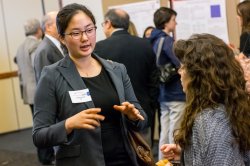Finding the right opportunity
Choosing the best program that meets your goals and provides you with the experience you need to excel academically and professionally.


Choosing the best program that meets your goals and provides you with the experience you need to excel academically and professionally.
The Project AROS Lab Research Intern program is a Montclair State University initiative in collaboration with the Wilson Center, offering rising MSU undergraduate students practical experience to hone their applied research skills by conducting scholarly research and putting it into practice.
The research intern will primarily work under the supervision of a Project AROS Lab (PAL) faculty member that is and includes a variety of research areas, such as outlined on the PAL research page. Research projects explore, among other areas, various archival resources and create powerful online tools to present research findings and archival content in a user friendly and interactive fashion. Students will acquire digital skills, including virtual mapping skills with ArcGIS software tools and gain familiarity with online publishing tools to transform research results into compelling blog-style stories for public dissemination. Research topics vary on the program cycle but include a range of historical and contemporary issues, such as Cold War world politics, human rights, and environmental justice. Research materials consist mainly of digitized archives, online sources, and social media. Program participants will learn how to collect, organize (code) and analyze large data sets, eventually putting their new skills into practice by drafting research summaries, digitally visualizing their findings, and reporting results among their peers.
The program is a virtual learning experience and offered during regular academic terms lasting one semester starting in the fall. Students register for a co-op course, (COED 401-403), to receive academic credit for the experience. The program experience is renewable twice.
The candidate is required to:
Please Contact Project AROS Lab at pal@montclair.edu or Macayla Mack at mackm@montclair.edu if you have any questions.
The Wilson Junior Researcher and Leadership (WJRL) program is a Montclair State University (MSU) initiative in collaboration with the Wilson Center, providing outstanding MSU undergraduate students with an opportunity to conduct research and hone essential leadership skills.
The junior researcher will primarily work on a multiyear research initiative, Project AROS, under the supervision of Professor Arnaud Kurze. The interdisciplinary research project aims at expanding the Wilson Center Digital Archive and improving its visibility and accessibility to a wider public audience, including lawmakers, practitioners, scholars and citizens. With a collection of over 10,000 historical documents, the goal of expanding the archives is driven by the idea of including new, compelling themes that also include cultural aspects and focus on society during the Cold War, but also in the period beyond, to better understand the legacy and impact of this era. While diplomatic history and international relations remain topical pillars in the online archive, sociopolitical and human rights related issues during and after the fall of the iron curtain will now also be included.
The program offers experiential opportunities associated with document curation and data visualization. It is a virtual learning experience and offered during regular academic terms lasting one academic year starting in the fall.
The candidate is required to:
Please contact Arnaud Kurze at kurzea@montclair.edu or Macayla Mack at mackm@montclair.edu if you have any questions.
Photo credit: Christina @ wocintechchat.com on unsplash